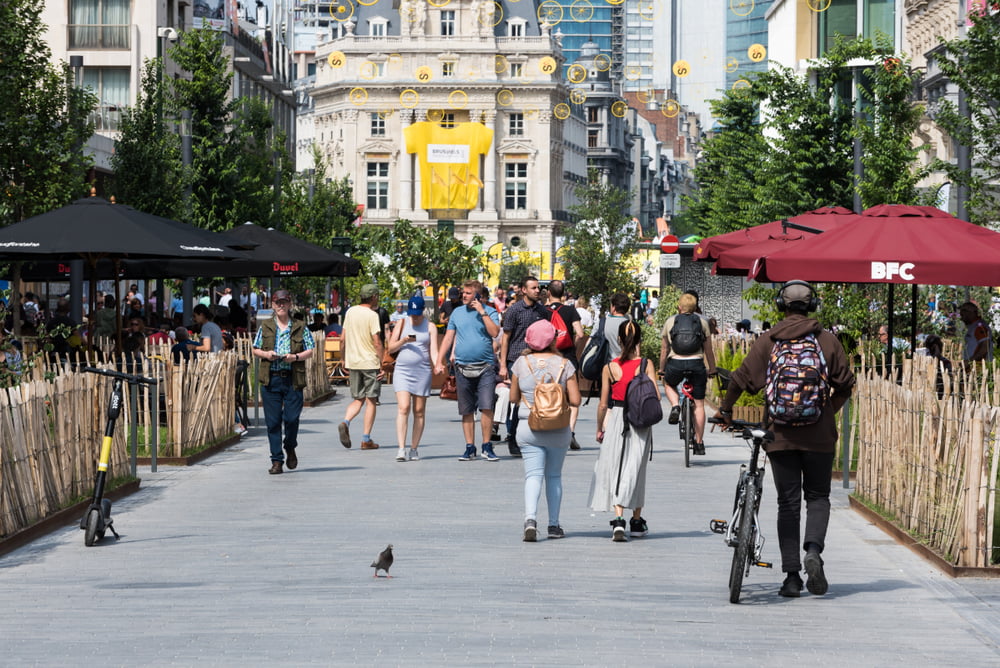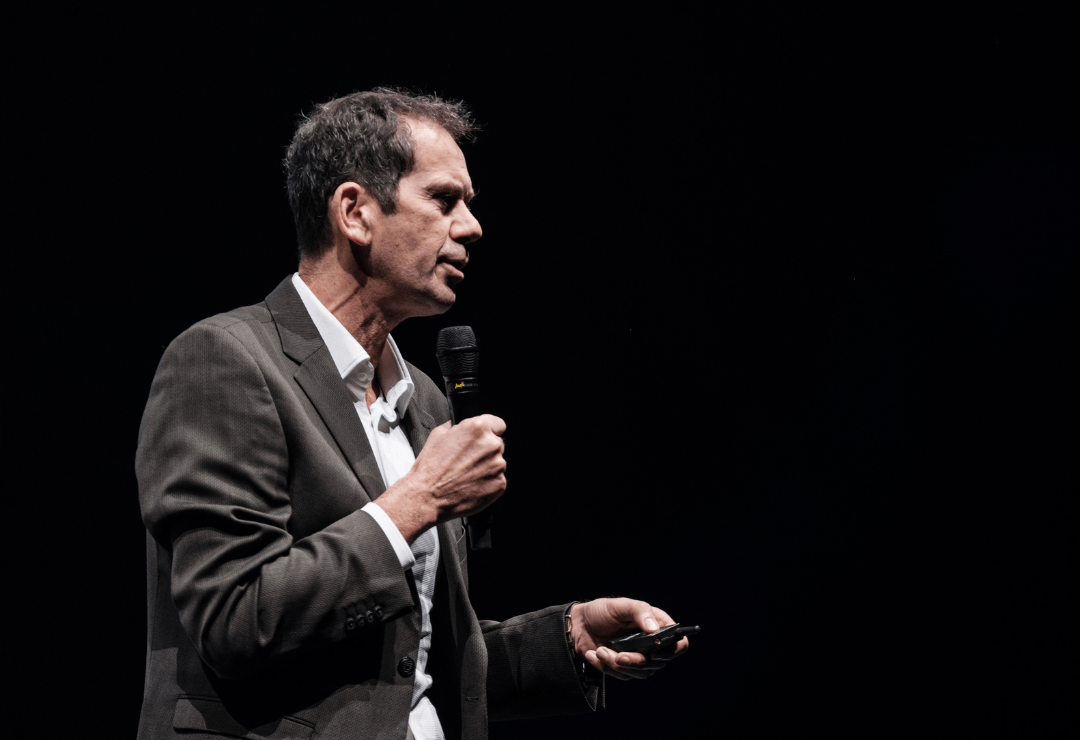Winning with Sustainable Mobility
In preparation for the Annual POLIS Conference 2023, POLIS speaks with the Keynote Speaker of our Closing Plenary, Stefaan Walgrave, Professor of Political Science at the University of Antwerp, to explore the nexus between politics and urban mobility, how policymakers’ own ambitions as well as their perceptions of public opinion come together to shape sustainable mobility policies, and why conservative bias is relevant for tomorrow’s transport.
An interview with Stefaan Walgrave, elaborated by Quaid Cey and Karen Vancluysen.
To listen to the recording of the article below, please accept all cookies.
The push (and pull) for sustainable urban mobility
Across Europe, sustainable mobility has become a hot topic amongst political leaders at the local, regional, and national levels. More than a few European cities are eager to lead the way, from Madrid, with its plan to make more than 450 hectares of the city centre nearly traffic-free, to Turku, the oldest city in Finland and the first to recast itself as a ‘city designed for walkability.’

Stefaan Walgrave, Professor of Political Science, University of Antwerp
However, not everyone is as excited about sustainable mobility as the leaders advocating for change, and a campaign for safer, greener, and more inclusive transport is not always a ticket to electoral success.
To uncover the link between politics and sustainable mobility, we spoke with Stefaan Walgrave, Professor of Political Science at the University of Antwerp, who has spent years researching politicians’ perceptions of public opinion. He reveals how conservative bias, violent protests, and the personal ideologies of today’s urban leaders all play an important role in shaping sustainable mobility policies.
POLIS: Based on your past research, what kind of assumptions would you say European politicians most often make about the beliefs and expectations of the public?
Stefaan Walgrave: There is quite a big stream of research in political science claiming that politicians take their perceptions of public opinion — what people want, how they want policy to evolve — into account when making policy.
Representation is kind of a clash between [politicians’] own opinions and ideologies concerning many topics and their perception of public opinion, and they try to strike a balance between those two drivers.
We know – and there is some research clearly showing it — that politicians look behind their backs constantly and try to know if the public agrees with them. If not, they will refrain from taking a policy initiative, reframe it, or first try to convince the public of a certain position or stance on a policy before they actually enact it.
So, the perceptions of politicians on public opinion are really important in [determining] how policies come about, and there is no reason why the mobility domain would be different in this respect.
POLIS: When it comes to sustainable mobility, what beliefs do politicians hold about the public’s opinion?
Walgrave: In general, I would expect that politicians overestimate the resistance to sustainable policy measures, including sustainable mobility policy measures. We call it the ‘conservative bias’ in the perceptions that politicians have concerning public opinion. We see it in environmental issues, migration issues, redistribution issues…
Very likely, sustainable mobility is also situated on the socio-cultural left-right cleavage, with right-wing parties more hesitant to enact sustainable mobility measures and left-wing or progressive parties much more willing to do so. Those who do, at least in Belgium, are the Green parties. If they are in power, they bring bikes in and they get rid of cars as much as possible in the city centres.

Cyclists navigating Ghent’s inner city low-emission zone. Credit: ©Stad Gent - Dienst Toerisme
We have seen in the past that when there are new rules about getting rid of cars and giving more space to bikes, pedestrians and public transport, there is a protest. In Ghent, for example, the Greens installed a kind of fundamental change in the inner city traffic and this led to quite a massive protest. The same thing happened in Brussels; it happens all the time.
Probably, politicians’ expectations about protest are generalised to the entire population. Of course, politicians should probably care more about vocal minorities than they should about lukewarm majorities. If those who are in favour of sustainable mobility policies do not stand up, and do not defend the policy, then politicians are right to be afraid of the electoral punishment of the vocal minority, which will change its vote based on the issue that they find very important.
The estimations of politicians may be wrong initially, but when policies are decided, maybe they are right. As soon as a policy turns into actual policy and people are no longer allowed to park their cars in front of their homes in the inner city, the resistance comes. When it becomes practical, operational, and personal, then there is probably more resistance than there is on a principled level.
What I am saying is that politicians are definitely cynical about how citizens would react, and they might be correct when it comes to implementing the policy, but when they have to estimate non-contextualised support, as asked in a survey, politicians mostly likely grossly underestimate public support for sustainable mobility policies.
POLIS: When politicians campaign for sustainability or try to ‘win with sustainable mobility,’ what is it that they are actually promising to citizens? What changes can citizens expect?
Walgrave: If they take their conservative perception of public opinion into account, they would probably refrain from campaigning for sustainable mobility because they think it is an unpopular position. They would try to avoid adopting an unpopular opinion, at least in public.
The Greens in many countries say, ‘We are on the defence. The majority of public opinion is right-wing, so we have to fight an uphill battle, and often we do not engage in the battle because we think it is a lost cause, so we do not even try.’ Then the question is, ‘How can actors convince citizens of the advantages of sustainable mobility?’

A biker enjoys a moment of low traffic in Leuven. Credit: Tobias Cornille, Unsplash
That is another matter. It is about how to sell, how to persuade, [how to convince people of] the advantages of sustainability. What I don’t believe is that the argument of ‘less is more’ works: saying, ‘Well, you will have less mobility, but cities will be safer.’ I do not think people want less mobility. I don’t think people want to give up mobility comfort for sustainability, so I think that, at least for me, the best argument is ‘Nothing will change; you will have the same comfort, and on top of that, you will have a safer, cleaner environment to live in.’
I do not believe that people will change their lives, so it needs to be low-threshold, cheap, and comfortable, at least that’s my opinion. It is a matter of introspection. When I look at my own behaviour, I consider myself to be totally environmentally friendly, but I will use my car so I can be back in an hour. I can bike, and biking is a good combination because you are getting exercise and being healthy, and, if you live close to the city, it is faster. But comfort is the crucial thing.
POLIS: What do the politicians stand to gain from campaigning for more sustainable mobility?
Walgrave: I think many of them truly believe that society would be better off with sustainable mobility – that cities would be more livable, safer, and healthier.
Political actors of course try to maximise their gains, for example, by winning popular support, but the gain is also in realising your dream, and I really do think that some politicians think they are making the world a better place by doing this. That is why they are in politics; that is the ideological reason.

Police on horseback monitor a peaceful protest against the ‘15 minute city’ in Oxford, England. Credit: Sarah2, Shutterstock
Then there is the more extrinsic motivation or instrumental reason, which is knowing that they can win elections by pleasing the majority of the public. Of course, the progressive parties, who are more in favour of sustainability, do not have to please the public as a whole if they please their own voters, or their potential voters — the voters who are closest to them.
Maybe they can win the elections by implementing big changes in urban mobility. For them, it is probably less dangerous to do this than for a right-wing party that has supporters who, in reality, oppose those policies more.
It is an estimation of one’s electorate. To come back to your question, I think it is an ideological matter: an ideological win. In Ghent and Leuven, where the Greens were in power, mobility plans were introduced that made it more difficult to have a car, and notwithstanding the resistance, I think they are proud that they introduced this.
POLIS: Do you see this political backlash to sustainable mobility as a conflict between the interest of the city as a whole and the individual citizen?
Walgrave: I think so. With regard to inner cities, it is a conflict between the inner city inhabitants and the people who live around the city. It is a kind of conflict of interest between those who use the city as a hub – as a kind of service centre — and those who actually live in the city.

Good Move, the mobility plan for a ‘Brussels on a human scale.’ Credit: Pascal Smet
[Those who] live in the inner city have certain privileges: they can park their car in the centre, for instance, so they like the policy. Most of the protest, I guess, is from people who do not live in the city but use it as a sort of service or cultural hub.
There clearly must be tensions between those who are affected and those who are privileged. It is difficult for politicians to strike a balance.
POLIS: If policymakers frame sustainable mobility as something that can help people rather than restrict them, how do you think this changes the political discourse?
Walgrave: I think politicians try to develop those arguments, but I am not sure they are very successful.
With regard to sustainable mobility, maybe we see something similar to what we saw with other kinds of bioethical policy changes, such as in the areas of gay marriage, gay adoption, euthanasia, abortion, and so on. We see that the policies that were adopted in Parliament often were ahead of public opinion. The policies were more left-wing, more progressive, and at the time of voting, many people did not agree with the policy. But then, once the policy was implemented, people got used to it.

Yellow Vests light open fires on the Champs Elysees during a protest in Paris. Credit: gaston_fournier, Shutterstock
Policy can follow public opinion, or policy can precede public opinion — it can lead to public opinion. Regarding bioethical issues, we clearly saw the second pattern.
If you are optimistic, you could say that with sustainable urban mobility, we might see the same thing. People realise after a while, ‘I was opposed to it in the beginning, but now that I look back on it, this is actually a better situation.’
It is also just a natural, reflexive resistance to change, whatever change there is. Politicians should overcome that conservative reflex that people have. I think the difficulty for politicians is to know when resistance will persist and is really deep-seated — when people feel that their liberty or their comfort is decreasing — and when the negative reaction is just a temporary resistance.
The conservative bias in public opinion perception — part of it, anyway — is simply the innate conservatism of people, and then of course there is the matter of real conservatism: that people ideologically do not want to change their lives. These two things are difficult to disentangle.
POLIS: For those who are ideologically resistant to changes in mobility planning, what do you think explains their aggressive reaction to the government’s policies?
Walgrave: I think often mobility policy is a kind of symbol. It is related to people having the impression that they lose comfort, and that’s a real thing, but then there’s also [the fact that] many of those people feel left behind or not represented. They think politics is an elite thing, that they are not being heard, and that no one defends their interests.

A Yellow Vest protestor poses in front of a destroyed speed camera in Lyon. Credit: Romain Lafabregue, AFP / Getty Images
I think that sustainable mobility policies are simply a case onto which the discontent with politics is projected. That’s why the resistance is radical and sometimes even violent. It’s not about mobility — it is about a more general idea or assessment: ‘People like me, we don’t have any power. We are constantly neglected. Politicians don’t know what we want. They do not bother. They disregard us.’
Since mobility policies are something that is immediately felt and also physical — for example, road furniture is something that you can destroy — then the enemy is palpable and visible. You can punish it; you can set fire to it.
This is very different from a new policy on unemployment benefits, for instance. What can you do against that? Set fire to the unemployment benefits building?
The enemy [in the case of mobility policies] is immediate, so you can physically resist the new situation. It is a good enemy because it allows you to turn your dissatisfaction into action that is directly targeted at the thing you despise.
With traffic policy, you can resist by setting fire to a traffic camera. It’s easier. The Gilets Jaunes attacked traffic cameras and traffic lights and occupied roundabouts. That makes mobility policy a good battlefield for people who feel left behind.
POLIS: What kinds of challenges do you think politicians will face after they have ‘won with sustainability’? Will they be able to deliver on the promises they made during their campaign, or will they need to adapt?
Walgrave: I think that probably in the long run, politicians do win with sustainable policies. Once people get over their cold-feet responses, once the policies are actually implemented, many people will probably agree after a while that this was the best choice and that their lives have become better and not worse.
I am not sure whether there are long-term consequences [for politicians]. The thing that I wonder is if, when politicians implement such policies against public resistance and then the policies later turn out to be successful and make the city better, there is an electoral reward for the politicians.

Anspach Avenue: A highlight of Brussels’ plans for sustainable mobility. Credit: Werner Lerooy, Shutterstock
Most voters vote prospectively: they think about the promises that politicians make for the future. This we know from voter research. So, I wonder if politicians would really be rewarded for implementing such a policy. Even if most of the people in the city agree with them after a while, I think the electoral benefits will be rather small. Any good policy delivers few [electoral] benefits because people vote based more on what politicians promise to do in the future than what they say they have done in the past — it weighs heavier on citizens’ considerations.
What politicians can be proud of is that they made the world a better place, they [stayed true to] their ideology, and they kept their promise. I think that is what is in it for politicians. It is more of a statesmanship idea — ‘I did my part; I changed the world’ — than an electoral reward.
Click here to read the article in its original format.
About the contributors:
Interviewee: Stefaan Walgrave has a PhD in Social Sciences and currently works as a professor at the University of Antwerp. As a researcher within the University of Antwerp’s Department of Political Science, he has expertise in political processes, mass media, elections, and social movements. He has conducted extensive research on politicians’ perceptions of public opinion.
Interviewer: Quaid Cey is a Communications Assistant at POLIS. His responsibilities include producing news and social media content, promoting POLIS events and campaigns, and contributing to the publication of Cities in motion. He has a BA in Liberal Arts & Sciences from the University of Maastricht (UM) and an MA in Communication Studies from the Vrije Universiteit Brussel (VUB).
Interviewer: Karen Vancluysen was appointed as Secretary General of POLIS in September 2014, after having been the network's Research Director for 8 years. Since 1998, she has been involved in urban mobility networking, innovation, and policy activities as well as a wide range of European urban transport research projects.
